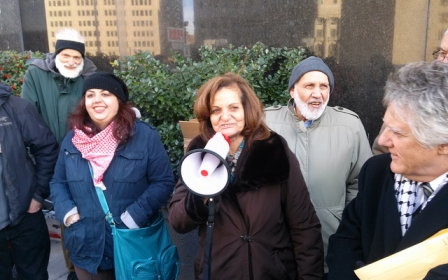VIDEO: Rasmea Odeh supporters hail lenient sentence as ‘victory’
DETROIT - Palestinian-American community leader Rasmea Odeh on Thursday was sentenced to 18 months in federal prison over immigration fraud, a lenient jail term considering the prosecution’s call for her to serve five to seven years.
“It is a victory,” said Hatem Abudayyeh, a national spokesman for the Rasmea Defense Committee.
Despite not avoiding jail time altogether and having her US citizenship revoked, Odeh will be allowed to stay out of prison while she appeals the decision.
The fact that Odeh will be able to remain among friends, family and supporters throughout the appeals process “will embolden people to continue to organise” for her cause, Abudayyeh told Middle East Eye.
During the sentencing hearing, the prosecution repeatedly told US district judge Gershwin Drain that given Odeh’s involvement in “terrorist” activities in the 1960s, she should receive an extra harsh punishment for lying on government forms.
Assistant US attorney Jonathan Tukel said that the failure to make an example of her would encourage others to lie about past criminal offenses in order to obtain US citizenship.
“The more serious the [criminal] offense [undisclosed on official forms], the more serious the punishment,” Tukel argued.
Odeh was convicted in November of unlawful procurement of naturalisation, with the government claiming she lied on official forms in 2004.
Asked whether she had been convicted of a crime or served jail time, Odeh answered “No”. She had in fact been jailed by Israel in 1969 for alleged involvement in two bombings in Jerusalem.
Though Odeh has claimed she misunderstood the questions on the forms, her legal defence has focused mainly on the nature of her conviction decades ago by an Israeli military court.
Odeh maintains that she was forced to confess to involvement in the attacks after being tortured and raped by Israeli officers, and later revoked her confession. Nevertheless, she spent ten years in Israeli custody before being released in a prisoner exchange in 1980.
She was not allowed to discuss her treatment in Israeli custody in court in November, prompting an outcry from supporters.
‘Positive, constructive’ contributions to society
Asking the judge to impose a five- to seven-year sentence, Tukel told the judge that Odeh was “an icon in the terrorist world”.
But defence attorney Michael Deutsch rejected this assessment.
“Don’t let this terrorism-pandering affect [your decision],” Deutsch told Drain.
He continued by praising Odeh’s community service work in Chicago, where she serves as the associate director of the Arab American Action Network and provides services to immigrants, especially women.
Deutsch said that many Americans get citizenship “automatically”, and yet do nothing to give back to the community. But Odeh has “taken nothing from this country but given a lot ... she has made an incredibly extraordinary contribution to this society.”
Ultimately Drain did not act on the prosecution’s recommendation to use Odeh’s alleged “terrorist activities” as a way to intensify the sentence.
“Looking at Ms. Odeh's recent history, I'm convinced she's really been involved in a lot of good works,” Drain said at the end of the hearing.
He said he had received dozens of letters from community leaders and activists commending Odeh’s service and asking for a lenient sentence.
“If she was a terrorist, she's changed. She's reformed and engaged in positive, constructive activities. That's a good thing. In fact, that's a great thing," Drain said.
But addressing a crowd of supporters after court was adjourned, Deutsch challenged the idea of associating Odeh with terrorism.
“Do you think she’s a terrorist, a reformed terrorist? I don’t. Obviously people are going to fight for their freedom against occupation ... they’re going to resist torture.”
Odeh’s defence team plans to appeal the sentence on the basis that she was not allowed to discuss her torture in Israeli prison throughout the trial. If the appeal is unsuccessful, she will serve the full 18-month sentence and be deported from the US.
Middle East Eye propose une couverture et une analyse indépendantes et incomparables du Moyen-Orient, de l’Afrique du Nord et d’autres régions du monde. Pour en savoir plus sur la reprise de ce contenu et les frais qui s’appliquent, veuillez remplir ce formulaire [en anglais]. Pour en savoir plus sur MEE, cliquez ici [en anglais].



